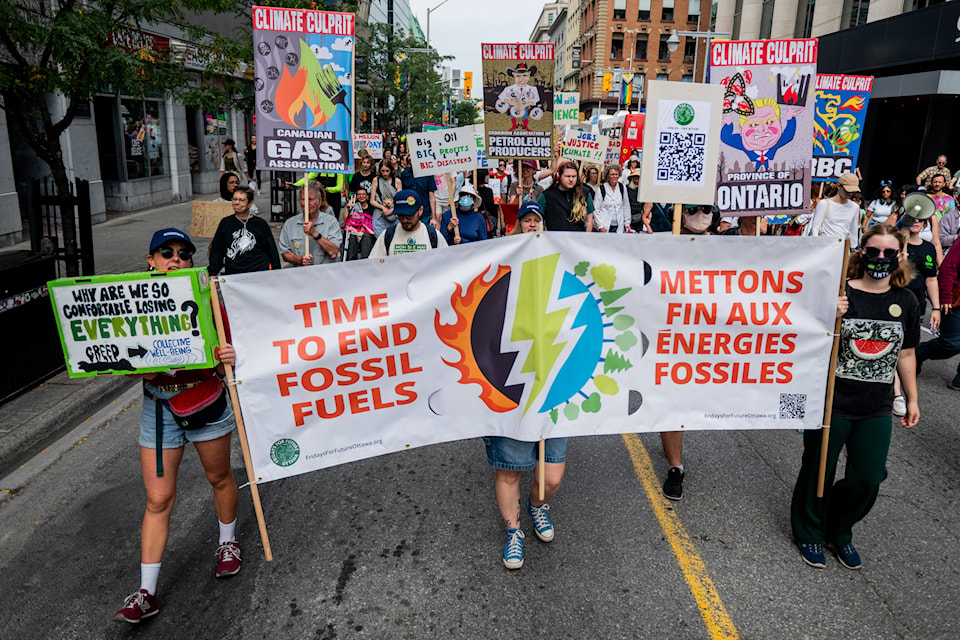Concern about climate change is declining among Canadians, according to an Abacus Data poll from Oct. 4, 2024.
The report showed 62 per cent of 1,701 adult Canadians were concerned about climate change and its potential future impacts, down 14 points from 2023 when 76 per cent showed concern.
The survey was taken between Sept.19 to 25, 2024, and has a margin of error of 2.38 per cent, 19 times out of 20.
The same poll said 30 per cent of Canadians believe Pierre Poilievre and the Conservatives are best equipped to address climate change, although this data was published before Mark Carney took the Liberals’ reins.
However, more recent data shows that Conservatives don’t see climate change as an issue facing Canada today.
A Leger poll from March 17, 2025, said zero per cent of Conservatives think climate change is Canada’s number one issue.
In the same poll, more Greens think inflation is a greater threat to Canada than climate change, at 21 per cent for inflation and 17 per cent for climate change.
The survey was recorded from March 14 to 16, 2025, and had 1,586 Canadian respondents, with a margin of error of 2.47 per cent 19 times out of 20.
On April 1, 2025, Prime Minister Mark Carney scrapped the consumer carbon tax in a bid to save Canadians money.
Marcel Jansen, spokesperson for Fridays for Future Toronto, said Carney's elimination the carbon tax aligns with Poilievre’s environmental attitude.
“The Conservatives were very successful in creating this false narrative that the carbon tax was costing Canadians a lot of money,” Jansen said.
“I feel like the Conservatives sort of won on that one,” he said.
Jansen said the carbon tax was beneficial to the economy while also forcing large corporations to lower their emissions.
“It’s an incredibly Conservative approach; it returned all the money it made back to consumers,” Jansen said. “It was just creating an artificial incentive for corporations to decarbonize, which is a great incentive.”
Despite the environment being prioritized beneath economics, Jensen said the environment and economy are directly related and improving the climate will improve the economy.
“I think people in general fail to understand that a lot of the resolutions for our climate issues are economic resolutions as well,” he said.
Jansen is a homeowner in Toronto and recently his homeowner’s insurance increased by 40 per cent due to “climate effects,” however, no claims have been made on the property.
Sandra Leutri, the sustainability manager at Humber’s Office of Sustainability, said investing in sustainable infrastructure will save Canadians money down the road.
“It’s a huge misconception that integrating environment and integrating long-term sustainability into your long-term planning will cost you money,” Leutri said.
Humber Polytechnic has invested in sustainability through its Integrated Energy Master Plan (IEMP). The college saved more than $11.4 million in utility fees since 2015 through the IEMP. The 2023-2024 report said Humber saved more than $2.7 million in utility costs in that period alone.
Leutri has made a few lifestyle changes herself to leave a lighter carbon footprint.
“I made a New Year’s resolution this year that any product I run out of, I'm gonna try and find an eco-friendly alternative for it,” Leutri said.
“Now I’ve slowly replaced all the hand soaps in my house, everything’s bar soap,” she said. “That was the easiest switch, and I’m actually saving a lot of money.”
However, Leutri said sustainable living isn’t easy for everyone, and Canada’s societal norms aren’t helping.
The eco-friendly alternatives Leutri searches for have to be purchased from a specific store because most stores have their products pre-packaged with single-use plastics.
“I try and make sure I’m getting groceries that are the least packaged as possible, but I have to go to two, three different grocery stores to be able to do that, and I’m still getting stuff in packaging,” Leutri said.
Leutri said everyone has to play their part in the fight against climate change, but it takes dedication.
“If it’s not convenient, people aren’t gonna do it,” she said.
Leutri said eliminating the carbon tax just isn’t enough, and gas prices are just going to rise for the sake of profits.
“All that’s gonna do is drive big oil to then raise those prices,” she said.
“It really is important that we push these people in power to actually look forward instead of going for the low-hanging fruit,” Leutri said.

